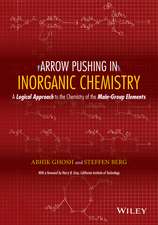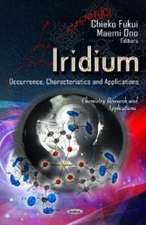Bond Valences: Structure and Bonding, cartea 158
Editat de I. David Brown, Kenneth R. Poeppelmeieren Limba Engleză Hardback – 9 sep 2014
The individual volumes in the series are thematic. The goal of each volume is to give the reader, whether at a university or in industry, a comprehensive overview of an area where new insights are emerging that are of interest to a larger scientific audience. Thus each review within the volume critically surveys one aspect of that topic and places it within the context of the volume as a whole. The most significant developments of the last 5 to 10 years should be presented using selected examples to illustrate the principles discussed. A description of the physical basis of the experimental techniques that have been used to provide the primary data may also be appropriate, if it has not been covered in detail elsewhere. The coverage need not be exhaustive in data, but should rather be conceptual, concentrating on the new principles being developed that will allow the reader, who is not a specialist in the area covered, to understand the data presented. Discussion of possible future research directions in the area is welcomed. Review articles for the individual volumes are invited by the volume editors.
| Toate formatele și edițiile | Preț | Express |
|---|---|---|
| Paperback (1) | 1215.70 lei 6-8 săpt. | |
| Springer Berlin, Heidelberg – oct 2016 | 1215.70 lei 6-8 săpt. | |
| Hardback (1) | 1221.69 lei 6-8 săpt. | |
| Springer Berlin, Heidelberg – 9 sep 2014 | 1221.69 lei 6-8 săpt. |
Din seria Structure and Bonding
- 24%
 Preț: 986.78 lei
Preț: 986.78 lei - 24%
 Preț: 1191.61 lei
Preț: 1191.61 lei -
 Preț: 683.13 lei
Preț: 683.13 lei - 18%
 Preț: 1820.52 lei
Preț: 1820.52 lei -
 Preț: 366.85 lei
Preț: 366.85 lei -
 Preț: 386.81 lei
Preț: 386.81 lei -
 Preț: 381.98 lei
Preț: 381.98 lei - 18%
 Preț: 1806.97 lei
Preț: 1806.97 lei - 18%
 Preț: 1219.01 lei
Preț: 1219.01 lei - 18%
 Preț: 1217.58 lei
Preț: 1217.58 lei - 18%
 Preț: 1215.70 lei
Preț: 1215.70 lei - 18%
 Preț: 1219.01 lei
Preț: 1219.01 lei - 18%
 Preț: 1219.31 lei
Preț: 1219.31 lei - 18%
 Preț: 1824.19 lei
Preț: 1824.19 lei - 18%
 Preț: 1823.39 lei
Preț: 1823.39 lei - 18%
 Preț: 1218.06 lei
Preț: 1218.06 lei - 18%
 Preț: 1821.95 lei
Preț: 1821.95 lei -
 Preț: 381.00 lei
Preț: 381.00 lei - 18%
 Preț: 1228.62 lei
Preț: 1228.62 lei - 18%
 Preț: 1218.21 lei
Preț: 1218.21 lei - 18%
 Preț: 1212.68 lei
Preț: 1212.68 lei - 18%
 Preț: 1820.08 lei
Preț: 1820.08 lei - 18%
 Preț: 1827.32 lei
Preț: 1827.32 lei - 18%
 Preț: 2090.92 lei
Preț: 2090.92 lei - 18%
 Preț: 1217.10 lei
Preț: 1217.10 lei - 18%
 Preț: 1821.81 lei
Preț: 1821.81 lei - 18%
 Preț: 1216.48 lei
Preț: 1216.48 lei - 18%
 Preț: 1820.22 lei
Preț: 1820.22 lei - 15%
 Preț: 640.24 lei
Preț: 640.24 lei - 18%
 Preț: 1811.86 lei
Preț: 1811.86 lei
Preț: 1221.69 lei
Preț vechi: 1489.87 lei
-18% Nou
Puncte Express: 1833
Preț estimativ în valută:
233.80€ • 253.87$ • 196.39£
233.80€ • 253.87$ • 196.39£
Carte tipărită la comandă
Livrare economică 23 aprilie-07 mai
Preluare comenzi: 021 569.72.76
Specificații
ISBN-13: 9783642549670
ISBN-10: 3642549675
Pagini: 262
Ilustrații: VIII, 262 p. 110 illus., 63 illus. in color.
Dimensiuni: 155 x 235 x 20 mm
Greutate: 0.56 kg
Ediția:2014
Editura: Springer Berlin, Heidelberg
Colecția Springer
Seria Structure and Bonding
Locul publicării:Berlin, Heidelberg, Germany
ISBN-10: 3642549675
Pagini: 262
Ilustrații: VIII, 262 p. 110 illus., 63 illus. in color.
Dimensiuni: 155 x 235 x 20 mm
Greutate: 0.56 kg
Ediția:2014
Editura: Springer Berlin, Heidelberg
Colecția Springer
Seria Structure and Bonding
Locul publicării:Berlin, Heidelberg, Germany
Public țintă
ResearchCuprins
Historical Perspective.- Bond Valence Theory.- Bond valence parameters and atom sizes.- Practical considerations in determining bond valence parameters.- The equal valence rule and crystal chemistry.- Using bond valences to model the structures of ternary and quaternary oxides.- Energy storage and ionic conduction.- Polymerization, Crystallization and Dissolution in Aqueous Solution: A Bond-valence Approach.- Structure and Reactivity in Aqueous Solutions and Oxide-Water Interfaces.- Analysis of solid surfaces.- Bond Valences in Education.
Textul de pe ultima copertă
The series Structure and Bonding publishes critical reviews on topics of research concerned with chemical structure and bonding. The scope of the series spans the entire Periodic Table and addresses structure and bonding issues associated with all of the elements. It also focuses attention on new and developing areas of modern structural and theoretical chemistry such as nanostructures, molecular electronics, designed molecular solids, surfaces, metal clusters and supramolecular structures. Physical and spectroscopic techniques used to determine, examine and model structures fall within the purview of Structure and Bonding to the extent that the focus is on the scientific results obtained and not on specialist information concerning the techniques themselves. Issues associated with the development of bonding models and generalizations that illuminate the reactivity pathways and rates of chemical processes are also relevant.
The individual volumes in the series are thematic. The goal of each volume is to give the reader, whether at a university or in industry, a comprehensive overview of an area where new insights are emerging that are of interest to a larger scientific audience. Thus each review within the volume critically surveys one aspect of that topic and places it within the context of the volume as a whole. The most significant developments of the last 5 to 10 years should be presented using selected examples to illustrate the principles discussed. A description of the physical basis of the experimental techniques that have been used to provide the primary data may also be appropriate, if it has not been covered in detail elsewhere. The coverage need not be exhaustive in data, but should rather be conceptual, concentrating on the new principles being developed that will allow the reader, who is not a specialist in the area covered, to understand the data presented. Discussion of possible future research directions in the area is welcomed.Review articles for the individual volumes are invited by the volume editors.
The individual volumes in the series are thematic. The goal of each volume is to give the reader, whether at a university or in industry, a comprehensive overview of an area where new insights are emerging that are of interest to a larger scientific audience. Thus each review within the volume critically surveys one aspect of that topic and places it within the context of the volume as a whole. The most significant developments of the last 5 to 10 years should be presented using selected examples to illustrate the principles discussed. A description of the physical basis of the experimental techniques that have been used to provide the primary data may also be appropriate, if it has not been covered in detail elsewhere. The coverage need not be exhaustive in data, but should rather be conceptual, concentrating on the new principles being developed that will allow the reader, who is not a specialist in the area covered, to understand the data presented. Discussion of possible future research directions in the area is welcomed.Review articles for the individual volumes are invited by the volume editors.
Caracteristici
This series presents critical reviews of the present position and future trends in modern chemical research concerned with chemical structure and bonding Short and concise reports, each written by the world's renowned experts Still valid and useful after 5 or 10 years More information as well as the electronic version of the whole content available at: springerlink.com Includes supplementary material: sn.pub/extras












